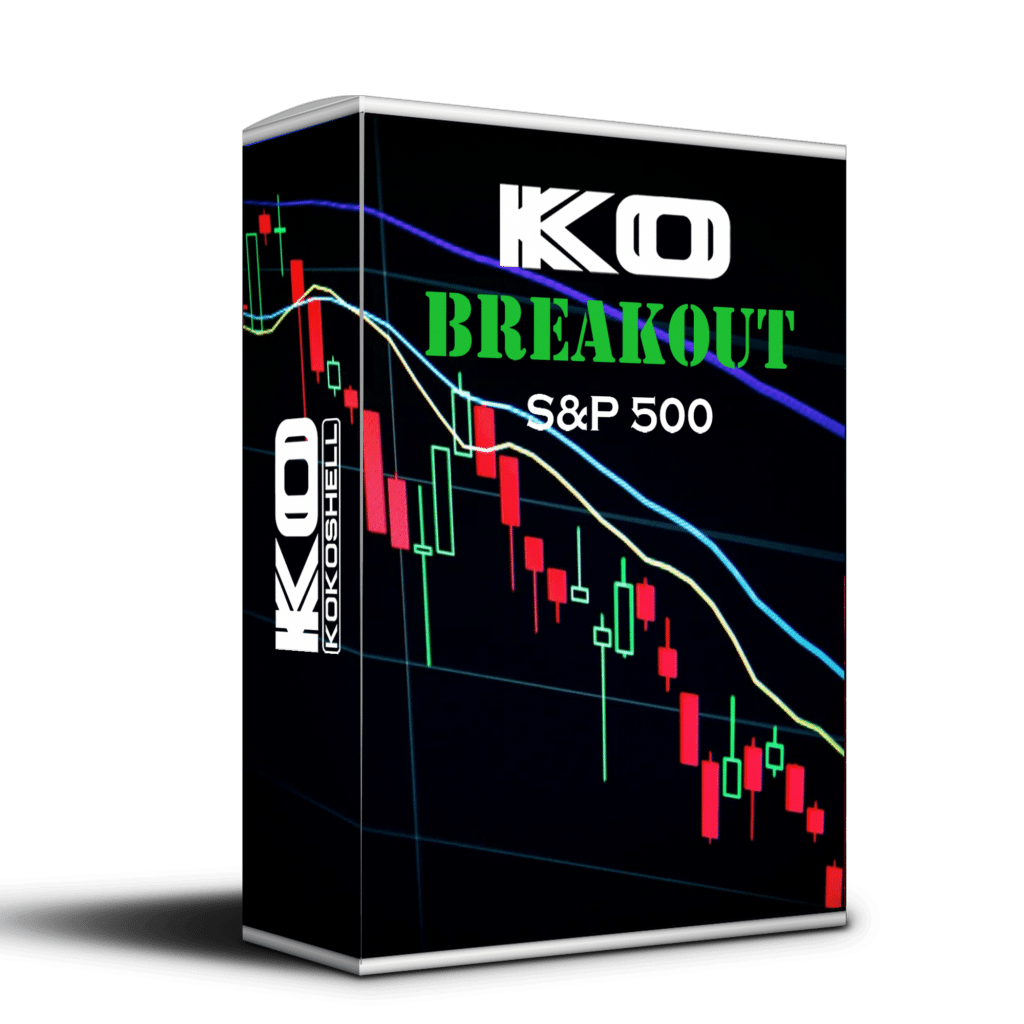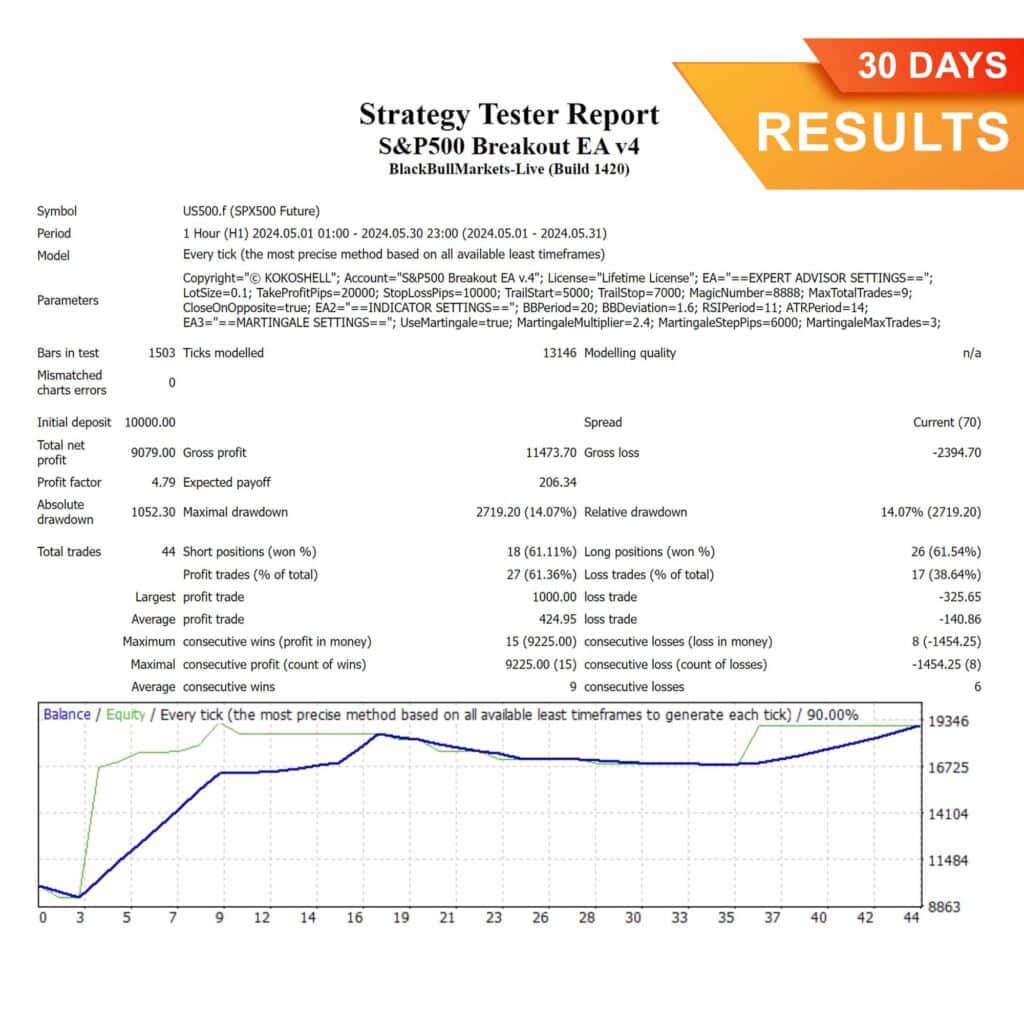Unleashing the Profit Potential of S&P500 Breakout EA
Learn how to make money with S&P500 Breakout EA, be profitable, and optimize your trading strategy using this cutting-edge tool. This expert advisor is engineered to capitalize on breakout trading opportunities in the S&P500 market, leveraging advanced algorithms to identify and exploit market breakouts. The volatility of the S&P500 index provides numerous opportunities for breakout trading. Automating your trades with S&P500 Breakout EA allows you to focus on strategic analysis while the EA efficiently manages trades, reducing the stress of manual trading.

Moreover, this EA offers a comprehensive suite of tools for traders aiming to maximize returns. It includes customizable settings for lot sizes, stop losses, take profits, and trailing stops, allowing adaptation to various market conditions and trading styles. The EA strategically uses technical indicators such as Bollinger Bands, RSI, and ATR to leverage market movements effectively. Additionally, risk management features like Martingale strategies and daily profit/loss limits help protect your capital.
To understand how to be profitable with S&P500 Breakout EA, it’s essential to fully comprehend and utilize its features. This guide will cover the importance of backtesting, refining input parameters, implementing risk management techniques, and selecting optimal trading hours to ensure you achieve a profitable S&P500 Breakout EA experience.
Profitable Trading with S&P500 Breakout EA: The Importance of Backtesting
Backtesting is a crucial step to understand how to optimize and make money with S&P500 Breakout EA and how to be profitable with S&P500 Breakout EA. This process simulates trading using historical data, providing insights into how the EA might perform under various market conditions. Recognizing the most effective input parameters tailored to your trading style and risk tolerance is a significant advantage of backtesting.
Why Backtesting is Essential
- Identify Optimal Settings: Experimenting with different parameter combinations through backtesting helps find the most profitable settings for the EA. Additionally, fine-tuning take profit and stop loss levels can significantly impact performance.
- Evaluate Performance Metrics: Backtesting allows you to analyze key metrics such as win rate, average profit/loss per trade, and maximum drawdown. These metrics offer a clear picture of the EA’s potential profitability and risk.
- Boost Confidence: Observing the EA’s historical performance enhances your confidence in its ability to handle live trading scenarios. Knowing that your strategy has previously succeeded provides reassurance.
- Stay Adaptive: As markets change, past performance might not ensure future success. Regular backtesting ensures your strategy stays relevant to current market conditions.
Example of a Backtesting Process

Begin by testing the S&P500 Breakout EA with two years of historical data. Start with the default parameters and observe the results. If the average drawdown exceeds your risk tolerance, reduce the stop loss to minimize drawdown, even if it slightly lowers the win rate. Through continuous adjustments, find a balance where the profit factor is acceptable, and the drawdown remains manageable. For instance, adjusting the stop loss from 30 pips to 25 pips might help reduce drawdown without significantly compromising profitability. This iterative process of backtesting and refining optimizes your strategy, making it a profitable S&P500 Breakout EA.
For detailed insights into mastering backtesting techniques, explore The Ultimate Guide for Backtesting. This resource is designed to elevate your trading strategy, ensuring you maximize the potential of your S&P500 Breakout EA. Discover it now at kokoshell.com/backtesting.
Fine-Tuning S&P500 Breakout EA for Enhanced Profitability
While S&P500 Breakout EA includes default settings, fine-tuning these parameters can significantly boost profitability. Experimenting with different lot sizes, stop losses, take profit levels, trailing stops, and indicator settings is essential to be profitable. Rigorous backtesting helps tailor these settings to find the most effective combination. Knowing how to make money with S&P500 Breakout EA requires ongoing optimization.
Key Parameters to Adjust
- Lot Size: Adjusting the lot size affects the trade volume and potential profit or loss. Conservative traders might prefer smaller lot sizes to limit risk.
- Take Profit: Setting an optimal take profit level ensures profits are secured when the market moves in your favor.
- Stop Loss: A strategically placed stop loss safeguards your capital against significant market reversals.
- Trailing Stop: This feature locks in profits by moving the stop loss level as the trade becomes profitable.
- Indicator Parameters: Fine-tuning settings for technical indicators like Bollinger Bands, RSI, and ATR is vital for generating accurate trading signals.
Example of Parameter Optimization
Suppose you start with a lot size of 0.1, a take profit of 50 pips, and a stop loss of 30 pips. During backtesting, you notice improved results with a take profit of 45 pips and a stop loss of 25 pips. Setting the trailing stop to activate at 20 pips with a trailing step of 15 pips maximizes profits. Additionally, adjusting the Bollinger Bands period to 20, RSI period to 14, and ATR period to 14 can enhance signal accuracy. This fine-tuning process involves testing various combinations to find the most effective settings to optimize S&P500 Breakout EA.
Benefits of Customization
- Maximized Profits: Finding the optimal take profit and stop loss levels maximizes each trade’s profitability.
- Reduced Drawdowns: Adjusting the stop loss helps minimize losses during adverse market conditions.
- Enhanced Risk Management: Customizing lot sizes, trailing stops, and indicator parameters aligns the EA’s risk profile with your personal risk tolerance.
Embracing Risk Management for Long-Term Success with S&P500 Breakout EA
Risk management is essential to know how to make money with S&P500 Breakout EA and be profitable. Implementing strategies such as setting daily profit and loss limits and cautiously using the Martingale method protects your investments. Ultimately, the goal is to maximize gains while minimizing potential losses.
Risk Management Techniques
- Daily Profit and Loss Limits: Setting these limits ensures that you secure profits and cap losses daily. This prevents overtrading and protects your capital.
- Martingale Strategy: While this strategy can help recover losses quickly, it exponentially increases risk. Use it sparingly and with strict limits.
- Position Sizing: Adjusting your lot size based on account equity helps maintain a consistent risk level.
Practical Example of Risk Management
Imagine setting a daily profit target of $500 and a maximum daily loss of $300. On a particular trading day, the EA hits the profit target by midday, stopping further trading and securing the profits. Conversely, if the EA reaches the maximum daily loss, it halts trading to prevent further losses. This disciplined approach ensures long-term profitability without taking excessive risks.
Optimizing S&P500 Breakout EA Performance with Prime Trading Hours
Trading during optimal hours can significantly enhance the performance of S&P500 Breakout EA. Knowing how to optimize and make money with S&P500 Breakout EA involves recognizing periods of high market liquidity and volatility. Adjust your EA’s settings to operate within these times to capture the most lucrative trading opportunities.
Best Trading Times
- London Session: Characterized by high liquidity and significant price movements.
- New York Session: Often overlaps with the London session, offering excellent trading opportunities.
- Asian Session: Generally quieter but can present steady trends.
Benefits of Trading at Peak Times
- Increased Liquidity: Higher liquidity means more buyers and sellers, resulting in tighter spreads and better trade execution.
- Higher Volatility: Greater price movements provide more opportunities for profitable trades.
- Reduced Slippage: Consequently, high liquidity periods reduce the risk of slippage, ensuring your trades are executed at desired prices.
If you don’t know the trading hours, visit forex.timezoneconverter.com. Select your time zone to instantly view market open and close times.
Example of Adjusting Trading Hours
Suppose backtesting shows the EA performs best during the London and New York sessions. Set the EA to start trading at 8:00 AM GMT and stop at 5:00 PM GMT. This adjustment ensures the EA operates during peak market hours, thus increasing the likelihood of capturing profitable trades. This step is crucial to optimize S&P500 Breakout EA for better performance.
Conclusion: Consistent Profits with S&P500 Breakout EA
To be profitable and know how to make money with S&P500 Breakout EA, adopting a well-thought-out strategy, conducting rigorous backtesting, and implementing robust risk management practices is essential. This powerful tool can transform your trading experience by automating processes and maximizing efficiency. However, the true potential of the EA is unlocked when you take the time to customize and optimize its settings to align with your unique trading style and goals.
Backtesting remains your ally in this journey. It allows you to fine-tune your parameters and understand the EA’s performance under various market conditions. Continuously refining your strategy helps you adapt to ever-changing market dynamics and stay ahead of the curve.
Risk management should always be a priority. Implementing strict daily profit and loss limits, and using strategies like Martingale cautiously, will protect your capital and ensure long-term success. Additionally, adjusting your trading hours to coincide with periods of high liquidity and volatility will enhance your trading outcomes.
By embracing these principles and diligently working on your trading approach, you can indeed be profitable and know how to make money with S&P500 Breakout EA. The journey to trading success is paved with continuous learning, adaptation, and disciplined execution. With the S&P500 Breakout EA by your side, you’re well-equipped to navigate the complexities of the forex market and achieve your financial goals. Always remember to optimize S&P500 Breakout EA to stay profitable.
Frequently Asked Questions about S&P500 Breakout EA
Can I Use S&P500 Breakout EA with Other Assets?
Although S&P500 Breakout EA is specifically designed for trading the S&P500 index, it can be adapted to other indices or commodities. However, thorough backtesting and optimization are crucial for each new asset to ensure the EA performs effectively. Different assets have unique characteristics, such as volatility and liquidity, which may require adjustments to the EA’s parameters. Always start with a demo account to test the EA on the new asset before using it in a live trading environment to mitigate risks and optimize S&P500 Breakout EA for diverse market conditions.
How Does S&P500 Breakout EA Utilize Technical Indicators?
S&P500 Breakout EA employs a combination of advanced technical indicators to spot profitable trading opportunities. Moreover, it primarily uses Bollinger Bands, RSI, and ATR to analyze market trends and price movements. Bollinger Bands help identify potential breakouts, signaling entry and exit points. Additionally, RSI measures momentum and identifies overbought or oversold conditions, refining entry and exit points. Furthermore, ATR assesses market volatility, ensuring effective stop-loss placement. By integrating these indicators, the EA can make informed decisions to optimize trading performance and maximize profits.
What Common Mistakes Should I Avoid When Using S&P500 Breakout EA?
To maximize your success with S&P500 Breakout EA, it is essential to avoid common pitfalls:
- Overtrading: Avoid setting the EA to trade excessively, as this can lead to higher transaction costs and increased risk.
- Ignoring Risk Management: Always implement strict risk management strategies, such as setting stop losses and profit targets.
- Lack of Regular Updates: Regularly update and optimize the EA to adapt to changing market conditions and maintain its effectiveness.
- Neglecting Market News: Stay informed about economic news and events that can impact the market, as sudden volatility can affect the EA’s performance.
By being mindful of these pitfalls, you can improve your trading outcomes and maintain consistent profitability.
How Can I Tailor S&P500 Breakout EA to My Specific Trading Goals?
Customizing S&P500 Breakout EA to suit your specific trading goals involves adjusting various parameters and settings:
- Trading Style: Define whether you prefer aggressive or conservative trading and adjust the lot sizes, stop losses, and take profits accordingly.
- Timeframes: Choose the trading timeframes that align with your strategy, such as short-term (minutes) or long-term (hours).
- Indicators: Modify the technical indicators and their settings, such as Bollinger Bands, RSI, and ATR, to better fit your analysis approach.
- Risk Tolerance: Set parameters that reflect your risk tolerance, such as maximum drawdown limits and trailing stops.
By tailoring these settings, you can align the EA with your trading preferences and goals, thereby enhancing its effectiveness.
What Are the Benefits of Using a VPS for S&P500 Breakout EA?
Using a VPS (Virtual Private Server) for S&P500 Breakout EA offers several benefits:
- 24/7 Operation: A VPS allows the EA to run continuously, without interruptions due to power outages or internet connectivity issues.
- Lower Latency: VPS servers are often located near trading servers, resulting in faster execution speeds and reduced slippage.
- Enhanced Security: VPS providers typically offer robust security measures to protect your trading data and account.
- Resource Management: A VPS dedicates specific resources to your EA, ensuring optimal performance without affecting your local computer’s resources.
Overall, using a VPS can significantly improve the reliability and performance of your S&P500 Breakout EA, helping you achieve better trading results.





